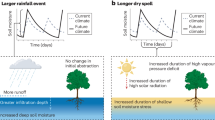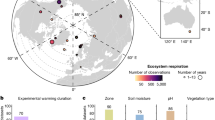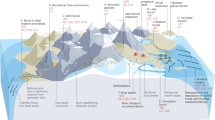Abstract
THE cation exchange capacity of soils is due to inorganic constituents such as clay minerals, hydrous oxides, primary and secondary minerals and to organic matter. Estimates of the contribution of organic matter are usually made by determining the cation exchange capacity of soils before and after destruction of organic matter. Using this approach, Gorbunov1 estimated that organic matter accounted for between 30 and 60 per cent of the cation exchange capacity of plough-depth layers of a number of Russian podzol soils.
This is a preview of subscription content, access via your institution
Access options
Subscribe to this journal
Receive 51 print issues and online access
$199.00 per year
only $3.90 per issue
Buy this article
- Purchase on Springer Link
- Instant access to full article PDF
Prices may be subject to local taxes which are calculated during checkout
Similar content being viewed by others
References
Gorbunov, N. I., referred to by Flaig, W., Sochtig, H., and Beutelspacher, H., Landbauforschung Volkenrode, 13, 13 (1963).
Schnitzer, M., and Desjardins, J. G., Soil Sci. Soc. Amer. Proc., 25, 362 (1962).
Peech, M., Alexander, L. T., Dean, L. A., and Reed, J. F., U.S. Dep. Agr. Circ., 757 (1947).
Author information
Authors and Affiliations
Rights and permissions
About this article
Cite this article
SCHNITZER, M. Contribution of Organic Matter to the Cation Exchange Capacity of Soils. Nature 207, 667–668 (1965). https://doi.org/10.1038/207667a0
Published:
Issue Date:
DOI: https://doi.org/10.1038/207667a0
This article is cited by
-
Geochemical and mineralogical characteristics of Pleistocene lignites and associated sediments of Marathousa coal field, Central Peloponnese, Greece
Chinese Journal of Geochemistry (1997)
-
Factors controlling the mineralogy and geochemistry of the recent surface sediments of the Kalloni Gulf, Lesvos Island, Greece
Geologische Rundschau (1983)
-
Authigenic associations between selected rare earth elements and trace metals in lacustrine sediments
Environmental Geology (1980)
Comments
By submitting a comment you agree to abide by our Terms and Community Guidelines. If you find something abusive or that does not comply with our terms or guidelines please flag it as inappropriate.



